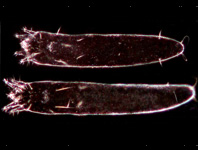Abstract
A new species of Lygodactylus gecko (L. wojnowskii sp. nov.) is described from the vicinity of Chogoria Town on the eastern lower slopes of Mt. Kenya in central Kenya. A phylogeny based on mitochondrial and nuclear DNA shows that the proposed new taxon is distinct within the Lygodactylus picturatus group and is the sister lineage to L. mombasicus and L. kimhowelli. It is morphologically very similar to both L. mombasicus and L. keniensis but its dorsal coloration and pattern is different. Its dorsum is grey with dark stripes while its head has black and white stripes that form a Y-shaped mark. While the male throat pattern is similar to that of L. mombasicus, that of the female is like that of females and some males of Lygodactylus keniensis. Lygodactylus wojnowskii sp. nov. has a higher number of post-postmental scales (6) than do its close relatives (5). The new species is distributed on the lower slopes of mid-altitude areas on eastern Mt. Kenya, but it may occur in other areas at similar elevations in central Kenya. It is associated with short, scattered trees within agricultural areas. It has not yet been recorded within the protected Chogoria forest block of Mt. Kenya forest. It is likely present in Mwea National Reserve as it occurs in nearby areas.
References
Bauer, A.M., DeSilva, A., Greenbaum, E. & Jackman, T.R. (2007) A new species of day gecko from high elevation in Sri Lanka, with a preliminary phylogeny of Sri Lankan Cnemaspis (Reptilia: Squamata: Gekkonidae). Mitteilungen aus dem Museum für Naturkunde in Berlin, 83 (Sonderheft), 22–32.
Castiglia, R. & Annesi, F. (2011) The phylogenetic position of Lygodactylus angularis and the utility of using the 16S rDNA gene for delimiting species in Lygodactylus (Squamata, Gekkonidae). Acta Herpetologica, 6 (1), 35–45.
Edgar, R.C. (2004) MUSCLE: multiple sequence alignment with high accuracy and high throughput. Nucleic Acids Research, 32 (5), 1792–1797.
http://dx.doi.org/10.1093/nar/gkh340Huelsenbeck, J.P. & Ronquist, F. (2001) MRBAYES: Bayesian inference of phylogenetic trees. Bioinformatics, 17, 754–755.
http://dx.doi.org/10.1093/bioinformatics/17.8.754
Kimura, M. (1980) A simple method for estimating evolutionary rate of base substitutions through comparative studies of nucleotide sequences. Journal of Molecular Evolution, 16, 111–120.
http://dx.doi.org/10.1007/BF01731581Malonza, P.K., Wasonga, V.D., Muchai, V., Rotich, D., Bwong, B.A. & Bauer, A.M. (2006) Diversity and biogeography of herpetofauna of the Tana River Primate National Reserve, Kenya. Journal of East African Natural History, 95 (2), 95–109.
http://dx.doi.org/10.2982/0012-8317(2006)95[95:DABOHO]2.0.CO;2Palumbi, S.R., Martin, A., Romano, S., McMillan, W.O., Stice, L. & Grabowski, G. (1991) The Simple Fool’s Guide to PCR, Version 2.0. Privately Published, Honolulu, Hawaii, 45 pp.
Portik, D.M., Travers, S.L., Bauer, A.M. & Branch, W.R. (2013) A new species of Lygodactylus (Squamata: Gekkonidae) endemic to Mt. Namuli, an isolated ‘sky island’ of northern Mozambique. Zootaxa, 3710 (5), 415−435.
http://dx.doi.org/10.11646/zootaxa.3710.5.2Röll, B. (2000) Two sympatric Lygodactylus species in coastal areas of Eastern Africa (Reptilia: Gekkonidae). Bonner Zoologische Monographien, 46, 189–198.
Röll, B. (2004) Lygodactylus luteopicturatus Pasteur, 1965 (1964), ein Synonym von Lygodactylus picturatus (Peters, 1870) (Sauria: Gekkonidae). Sauria, Berlin, 26 (1), 31–35.
Röll, B. (2013) Tagaktive Zwerggeckos der Gattung Lygodactylus. Lebensweise — Haltung — Nachzucht. Natur und Tier - Verlag, Münster, 118 pp.
Röll, B., Pröhl, H. & Hoffmann, K-P. (2010) Multigene phylogenetic analysis of Lygodactylus dwarf geckos (Squamata:Gekkonidae). Molecular Phylogenetics and Evolution, 56, 327–335.
http://dx.doi.org/10.1016/j.ympev.2010.02.002Ronquist, F. & Huelsenbeck, J.P. (2003) MrBayes 3: Bayesian phylogenetic inference under mixed models. Bioinformatics, 19, 1572–1574.
http://dx.doi.org/10.1093/bioinformatics/btg180
Spawls, S., Howell, K.M., Drewes, R.C. & Ashe, J. (2002) A Field Guide to the Reptiles of East Africa. Princeton University Press, Princeton, NJ, 544 pp.
Tamura, K., Peterson, D., Peterson, N., Stecher, G., Nei, M. & Kumar, S. (2011) MEGA5: Molecular evolutionary genetics analysis using maximum likelihood, evolutionary distance, and maximum parsimony methods. Molecular Biology and Evolution, 28, 2731–2739.
http://dx.doi.org/10.1093/molbev/msr121Wagner, P. & Böhme, W. (2007) The amphibians and reptiles of Kakamega Forest, Western Kenya. Salamandra, 55, 123–150.
Wagner, P., Köhler, J., Schmitz, A. & Böhme, W. (2008)The biogeographical assignment of a west Kenyan rainforest remnant. Further evidence from analyses of its reptile fauna. Journal of Biogeography, 35, 1349–1361.
http://dx.doi.org/10.1111/j.1365-2699.2008.01883.x

